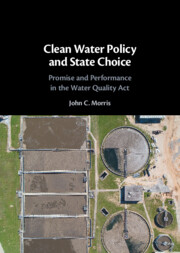Book contents
- Clean Water Policy and State Choice
- Clean Water Policy and State Choice
- Copyright page
- Dedication
- Epigraph
- Contents
- Figures
- Tables
- Foreword
- Acknowledgments
- Abbreviations
- Introduction
- 1 Setting the Stage
- 2 Reagan Federalism, States’ Rights, and the Revolving Loan Fund Model
- 3 The Foundations of Water Quality Policy in the United States
- 4 Expansion and Contraction in the Federal Role in Water Quality Policy
- 5 Features of the Water Quality Act of 1987
- 6 A Model of State Implementation of the Clean Water State Revolving Fund Program
- 7 Initial State Implementation of the Revolving Loan Fund Model
- 8 Implementation “On the Ground”
- 9 The Distributional Impacts of the CWSRF
- 10 Promise and Performance
- Book part
- About the Author
- Notes
- References
- Index
9 - The Distributional Impacts of the CWSRF
A National Analysis
Published online by Cambridge University Press: 10 March 2022
- Clean Water Policy and State Choice
- Clean Water Policy and State Choice
- Copyright page
- Dedication
- Epigraph
- Contents
- Figures
- Tables
- Foreword
- Acknowledgments
- Abbreviations
- Introduction
- 1 Setting the Stage
- 2 Reagan Federalism, States’ Rights, and the Revolving Loan Fund Model
- 3 The Foundations of Water Quality Policy in the United States
- 4 Expansion and Contraction in the Federal Role in Water Quality Policy
- 5 Features of the Water Quality Act of 1987
- 6 A Model of State Implementation of the Clean Water State Revolving Fund Program
- 7 Initial State Implementation of the Revolving Loan Fund Model
- 8 Implementation “On the Ground”
- 9 The Distributional Impacts of the CWSRF
- 10 Promise and Performance
- Book part
- About the Author
- Notes
- References
- Index
Summary
The Water Quality Act contained language that expressed the intent of Congress for the Clean Water State Revolving Fund (CWSRF) program to serve certain classes of communities: communities with significant environmental need, communities with populations less than 10,000, and communities facing financial hardship. In addition, Congress allowed CWSRF funds to be used to fund nonpoint pollution projects. Using data from EPA in conjunction with other data, a series of regression models are presented to determine the factors and conditions that lead states to meet these uses. The models and hypotheses tested in this chapter are developed in Chapter Six. Using data for all 50 states measured between 1988 and 2016, the models indicate that factors over which states have control- whether to leverage, the program structure, and others- determine the ability of states to meet the needs of most categories of applicants. State political factors are less important, although demographic variables do provide some explanatory power. Water quality needs matter for communities with significant environmental need. The results also indicate that communities facing financial hardship are not being well served by the program.
Keywords
- Type
- Chapter
- Information
- Clean Water Policy and State ChoicePromise and Performance in the Water Quality Act, pp. 190 - 223Publisher: Cambridge University PressPrint publication year: 2022

